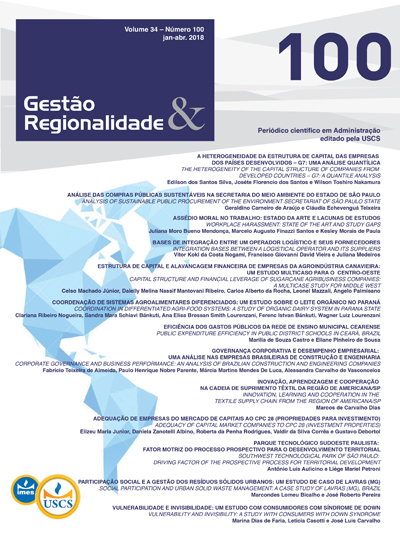SOCIAL PARTICIPATION AND URBAN SOLID WASTE MANAGEMENT: A CASE STUDY OF LAVRAS (MG), BRAZIL
DOI:
https://doi.org/10.13037/gr.vol34n100.2968Abstract
The purpose of this article is to analyze the social participation in the urban solid waste management from the perspective of social and environmental management. The National Solid Waste Policy has presented big challenges to municipalities, especially regarding social participation in integrated waste management. As a methodological procedure, a descriptive qualitative and quantitative study was conducted in Lavras (MG). The qualitative stage was conducted through semi-structured questionnaires applied to the public administration and to the Association of Recyclable Materials Collectors. The quantitative stage was conducted through structured questionnaires applied to a sample (significance level of 95% and sampling error of 5%) of the population from Lavras. The results show that the municipality is taking actions to meet up the policy, however there is a lack of social and environmental management in this process, especially regarding low social participation.
Keywords: Social participation; National Solid Waste Policy; social management; environmental management.
Downloads
Downloads
Published
How to Cite
Issue
Section
License
Copyright (c) 2018 Marcondes Lomeu Bicalho, José Roberto Pereira (Autor)

This work is licensed under a Creative Commons Attribution-NonCommercial-NoDerivatives 4.0 International License.
Autores que publicam nesta revista concordam com os seguintes termos:
- Autores mantém os direitos autorais e concedem à revista o direito de primeira publicação, com o trabalho simultaneamente licenciado sob a https://creativecommons.org/
licenses/by-nc-nd/4.0/ , permitindo o compartilhamento do trabalho com reconhecimento da autoria do trabalho e publicação inicial nesta revista. - Autores têm autorização para assumir contratos adicionais separadamente, para distribuição não-exclusiva da versão do trabalho publicada nesta revista (ex.: publicar em repositório institucional ou como capítulo de livro), com reconhecimento de autoria e publicação inicial nesta revista.
- Autores têm permissão e são estimulados a publicar e distribuir seu trabalho online (ex.: em repositórios institucionais ou na sua página pessoal) a qualquer ponto antes ou durante o processo editorial, já que isso pode gerar alterações produtivas, bem como aumentar o impacto e a citação do trabalho publicado (Veja O Efeito do Acesso Livre).
























